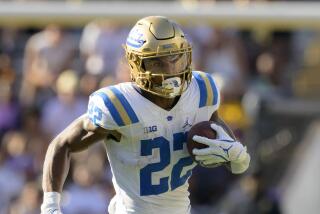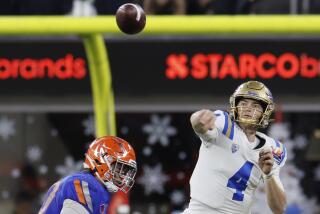UCLA aims for top 25 as it works to reestablish football program
The UCLA football team is back to defend its Pac-12 South Division championship this season … after firing its head coach.
Contradictions are not uncommon when it comes to the Bruins and football.
The school is near where the surf meets the recruiting turf, surrounded by some of the nation’s best high school talent. The combination seems right for a national power, yet the Bruins have an 81-80 record since their last Rose Bowl appearance in the 1998 season.
Money and academic standards have long been cited as obstacles by fans and, quietly, by athletic department officials.
But the landscape has shifted, possibly just enough.
The Pac-12 Conference’s lucrative television contract, and the promise of more cash from the league’s own TV network, made the rich richer and should also boost the other programs. As for the academic hurdle, Stanford was 23-3 the last two seasons.
So is the Bruins’ time coming?
“We have never deviated from the belief that we should be a national player on an annual basis,” Athletic Director Dan Guerrero said. “We should be at least ranked every year.”
UCLA has not been ranked in 77 consecutive polls. First-year Coach Jim Mora was brought in to alter that course, and his first game is against Rice in Houston on Thursday.
“I don’t like the word ‘rebuilding’ because it has negative connotations,” Mora said. “We’re going to try to win as fast as we can.”
He also cautioned, “It is a process. It does take time.”
This is the third football coach Guerrero has hired in 10 years. The previous two — Karl Dorrell and Rick Neuheisel — were a combined 56-56.
“Jim has brought an infusion of energy and elements of toughness and discipline, which, frankly, we’re very pleased to see,” Guerrero said. “We’re looking to see that translate onto the field.”
If it does, Guerrero said, “we have a chance to break into the top 25 again and reestablish the program where we want it to be.”
Last season, with USC in the final year of a bowl ban and ineligible for the Pac-12 championship game, the Bruins were one upset away from going to the Rose Bowl. Yet UCLA had fired Neuheisel, making him a lame duck before it played Oregon in the conference title game. The final straw was being routed, 50-0, by USC in the regular-season finale.
The Bruins’ 6-8 season was capped by a listless loss to Illinois in the Kraft Fight Hunger Bowl.
The television money being tossed around college football has “everyone ramping up,” Guerrero said. “We’ve got to keep pace.”
Neuheisel tactfully said at the start of last season that UCLA needed to support the football program better. He cited Oregon and USC as examples. Later, with his job on the line, Neuheisel became more blunt, comparing coaching UCLA to “taking a knife to a gunfight.”
Other reasons for the Bruins’ malaise seemed to rest with Neuheisel. Talent wasn’t developed, injuries exposed a lack of quality depth, and there was a radical shift in offensive philosophy.
The university had signed off on a handful of academically borderline recruits. Some worked out — defensive end Datone Jones has been an honor roll student. Some did not — tight end Morrell Presley flunked out.
The money situation was improved. A decade ago, UCLA paid Dorrell $600,000 per season. Neuheisel received a base salary of $1.25 million per season.
Still, UCLA lacked deep-pocket resources that were available at Oregon and USC. That changed when the Pac-12 negotiated a 12-year, $12.7-billion deal with ESPN and Fox.
“There has been a 350% increase in conference deals the last five or six years,” said sports media consultant Kevin O’Malley, a former sports executive at Turner Broadcasting and CBS. “Such an incremental and dramatic increase in television revenue was a godsend to the public institutions.”
Every school in the Pac-12 started tossing cash around. Washington State gave new Coach Mike Leach a five-year, $11-million contract. Arizona lured Rich Rodriguez with a five-year, $9.55-million contract.
At UCLA, Mora received a five-year, $11.235-million deal and the payroll for assistant coaches was bumped from $1.685 million in 2011 to $2.12 million this season.
“We can anticipate [certain] revenue, which was not the case in the past,” Guerrero said.
UCLA officials expect $17.6 million from television, multimedia and apparel and product revenue this year. More money is on the way, from the TV deal and the conference’s own network.
While USC opened the $70-million McKay Center last week and Oregon is constructing a $68-million football facility, UCLA has plans of its own. Spaulding Field, the Bruins’ tattered practice facility, got a face-lift with new turf, and there are plans to construct a football building.
“Oregon has received large individual gifts, Oklahoma State certainly has, and USC was always well-endowed,” O’Malley said. The new contract, he said, “has leveled the playing field a bit.”
More money, though, isn’t always the answer.
Former UCLA athletic director Peter Dalis said that when he took over the department in 1983, “we had a $900,000 deficit.” The Bruins went to Rose Bowls in 1982, 1983 and 1985.
“We didn’t always win the Pac-10, but we tended to be in the hunt every year,” said Dalis, who left the program with a $5-million surplus.
Dalis said that different college football eras are “like comparing apples and oranges.” But, he pointed out, “back then, the big deal was you could never beat Nebraska because it had the best facilities. Nebraska had some tough years with the same facilities. There is a lot of mythology in college athletics.”
Stanford broke up another one, with Coach Jim Harbaugh showing high IQs and double-digit victories can coexist. The Cardinal went to the Orange Bowl in the 2010 season and — after Harbaugh left — the Fiesta Bowl in 2011.
“That was a program that really needed to come a long way,” Guerrero said of Stanford. “They hired a coach who essentially changed the focus of their program. It translated into being a national power.”
Which is what Guerrero envisions for UCLA.
twitter.com/cfosterlatimes
More to Read
Go beyond the scoreboard
Get the latest on L.A.'s teams in the daily Sports Report newsletter.
You may occasionally receive promotional content from the Los Angeles Times.











